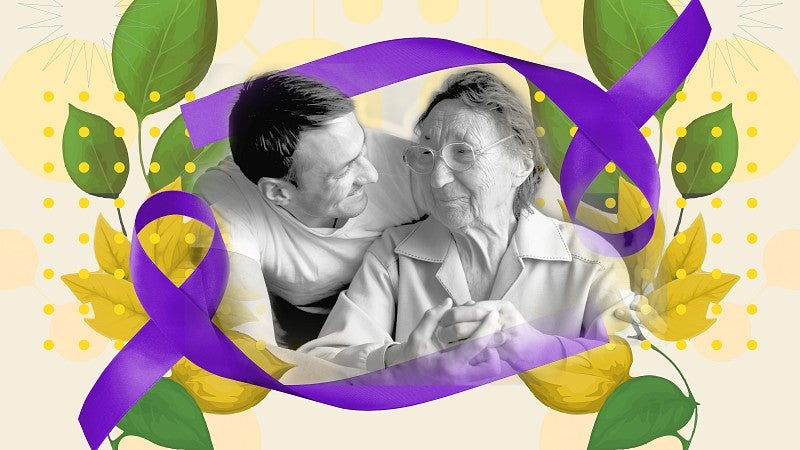
How to Care for Someone with Swallowing Problems
Samantha Shune, an expert on aging and mealtime, troubleshoots this frequent problem of dementia
By Emily Halnon • Illustration by David Gill • April 3, 2024
4 min read
Caring for someone with dementia is difficult enough, and it doesn’t help that one of the most common complications isn’t on most people’s radars.

“The prevalence of dysphagia, when it’s difficult for the individual to swallow, is a really understudied piece of dementia,” says Samantha Shune, an associate professor in the University of Oregon College of Education. She directs the Communication Disorders and Sciences Program.
Dysphagia is a disorder that makes it hard to swallow food and liquid. Swallowing is a complex process that involves muscles in the mouth, throat, and esophagus; dysphagia impairs this musculature and causes symptoms like coughing, choking, regurgitation, painful swallowing, and the sensation of food “sticking” in the esophagus.
Dysphagia can also cause food and drink to enter the lungs, increasing the risk of infection and pneumonia. Up to 33 percent of older adults experience dysphagia and that number can increase to more than 80 percent for those with conditions such as dementia and Parkinson’s disease.
Shune’s research sheds light on how swallowing issues affect caregivers and informs better interventions. She is especially interested in better understanding how shared mealtimes can improve quality of life for older adults and their caregivers. Her current research, which is funded by a $400,000 grant from the National Institutes of Health, examines how dysphagia influences the burden on caregivers.
“There’s a real financial, emotional, and physical burden with caregiving,” says Shune. “Finding ways to manage dysphagia can help improve the care recipient’s quality of life and ease the toll of caregiving.”
Shune has five recommendations to help caregivers support patients with dysphagia—while also caring for themselves.
Five tips for caregivers
1
Learn the signs of swallowing struggles
Though up to 93 percent of people with dementia develop a swallowing issue, many cases go undiagnosed due to a lack of training and education for clinicians.
“Knowing the signs of dysphagia could help you catch it early,” Shune says, “so you can develop a more effective treatment plan and lower the risk of medical complications.”
Caregivers should ask themselves:
- Does the person cough when drinking?
- Does it take them longer to eat than others at the table?
- Are they avoiding certain foods?
- Have they lost weight?
If the answer to any of these is yes, discuss the possibility of dysphagia with a medical provider.
2
Reduce fatigue during meals
A caregiver can help a person with swallowing difficulty by reducing fatigue they experience while eating. This also helps ensure they’re getting adequate hydration and nutrition.
Says Shune: “Have a variety of offerings, with some foods that are harder to chew and others that are easier to chew, so they can pivot to a softer option as they get tired.”
Also, she adds, make sure meals include familiar foods the person likes.
3
Set goals
Dysphagia doesn’t affect just swallowing and mealtimes. It also challenges people’s lives in other ways, from diminished social activity to increased stress.
Have a conversation with the person’s family, friends, and medical team about what to prioritize in care to preserve and enhance quality of life.
“Maybe you’ve always had family dinners and want to make sure you still have a chance for nightly conversations,” says Shune. “You can find ways to do that without eating.”
4
Learn how to handle an emergency
“It can be really stressful to hear someone coughing a lot while eating,” says Shune. “But sometimes, coughing is a good thing because it means air is flowing.”
She encourages caregivers to learn the difference between coughing and choking—when air stops flowing—so they know when to intervene. Resources include the Mayo Clinic and MedlinePlus.
Shune also recommends learning the Heimlich maneuver to stop a choking event.
5
Take care of yourself, too
“If the caregiver’s health and well-being is impacted, they’re less likely to be able to provide care and it can turn into a vicious cycle that negatively affects everyone,” says Shune. “The needs of the caregiver must be met so they can be successful in that role as well as in other parts of their life.”
Caregivers should participate in support groups, prioritize mental and physical health, and recruit help so they can take breaks to do things they love and need, whether that’s going to a medical appointment or grabbing a coffee with a friend.
Regarding caregivers and patients, Shune says, “the needs and well-being of both people have to be prioritized.”
Emily Halnon is a freelance writer in Eugene whose work has been published in the Washington Post, the Guardian, Salon, CNN, Runner’s World, and Trail Runner Magazine.
If you are interested in learning more about dysphagia and Samantha Shune’s work or participating in current studies, email her at eatinglab@uoregon.edu.




